From protests to politics: How gig workers are reshaping Southeast Asia’s power balance
Southeast Asia’s delivery and ride-hailing drivers have become a political and economic force that governments and companies can no longer ignore, experts say. Can they convert street power to lasting political leverage?
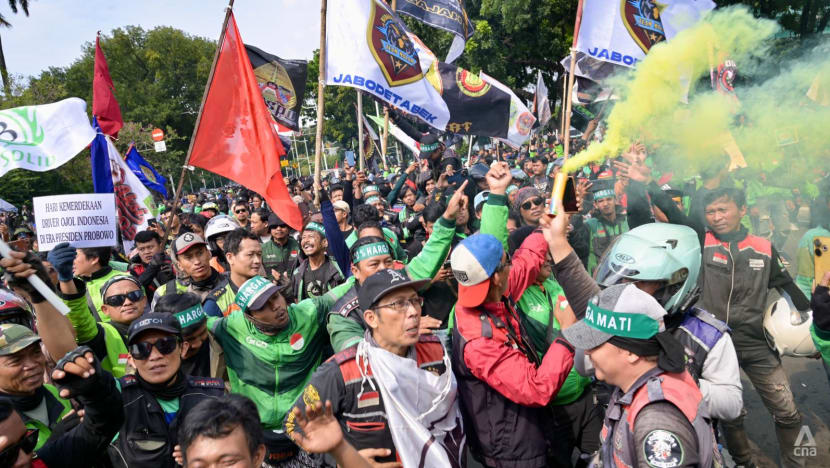
Hundreds of ride-hailing drivers staged a protest around the National Monument (Monas) complex in Central Jakarta on May 20, 2025. (File Photo: CNA/Ridhwan Siregar)

This audio is generated by an AI tool.
JAKARTA: When delivery rider Affan Kurniawan was killed by a police vehicle during a demonstration in Jakarta on Aug 28, his colleagues did not grieve quietly.
Within hours, WhatsApp groups lit up and around 1,000 riders in green and yellow jackets halted work to join a motorcade procession to his final resting place.
Indonesian politicians quickly took notice. Former presidential candidate and long-time opposition figure Anies Baswedan attended Affan’s funeral in the morning of Aug 29. That same evening, President Prabowo Subianto visited Affan’s home to offer support to the 21-year-old’s family.
Also on Aug 29, demonstrations involving delivery riders and app-based drivers against police brutality and other issues erupted in multiple cities in Indonesia, some of which turned violent.
Experts said the impromptu motorcade and the near-simultaneous protests underscored the riders’ solidarity and the speed with which their networks could mobilise.
“Through WhatsApp, Telegram, and social media, information spreads quickly and actions can be coordinated within hours,” said Indonesia-based transportation observer Muhammad Akbar.
“For small matters, such as collecting donations for a colleague in distress, they can mobilise instantly. When it comes to bigger issues, simultaneous protests can easily erupt across multiple cities.”
The gestures by Prabowo and Anies, two of Indonesia’s most powerful political figures, signalled something else: Gig workers are no longer invisible service providers, but a political force to be reckoned with.

“Politicians see delivery and motorcycle taxi riders as a strategic voter segment,” Akbar told CNA.
“Their numbers are huge, spread across cities, and considered influential over their families and communities. They are often positioned as important urban swing voters. A single visit to (riders’) basecamp can give a politician wide media coverage and a strong image of closeness to the people.”
What unfolded in Jakarta is emblematic of a wider trend across Southeast Asia, where app-based gig workers have staged at least 20 protests since 2020 over unfair wages, lack of social protections and lack of transparency, according to checks by CNA.

Some gig worker protests since 2020
- August - September 2025: In Indonesia, motorcycle taxi riders protested across the country following the death of Affan Kurniawan, who was hit by a police vehicle on Aug 28 while doing a delivery amid a protest against perceived unfair perks for lawmakers.
- Jul 21, 2025: Thousands of “ojol” riders protested in front of the Presidential Palace in the “Aksi 217” demonstration. Local riders’ organisation Garda Indonesia said about 50,000 people participated. One of their demands was a 90:10 revenue split between the riders and app operators.
- May 20, 2025: Hundreds of ride-hailing and delivery riders protested in various Indonesian cities. They demanded better wages, more equitable commission structures and were concerned about the proposed GoTo-Grab merger.
- Aug 28, 2024: Over 1,000 motorcycle taxi drivers staged a strike in several Indonesian cities to protest low pay and unfair practices by ride-sharing companies. They gathered outside the communications ministry and near the Jakarta offices of GoTo and Grab.
- May 2024: In the Philippines, about 180 Foodpanda riders in Baguio City staged a “tigil byahe” or temporary halt of delivery operations to demand fair pay, just benefits and better working conditions. The riders’ strike prompted the city council to conduct a dialogue with them on May 27.
- Oct 10, 2023: In Indonesia, around 1,500 online motorcycle taxi riders joined the “10.10” protest organised by Indonesian Transport Workers Union (SPAI) to reject several manpower policies, such as being classified as “driver-partners”.
- Feb 28, 2023: In Malaysia, some 100 food delivery riders gathered in Bukit Mertajam, Penang to present a memorandum to a food delivery company’s representative, expressing concerns over new, lower wage rates.
- Sep 21, 2022: Over 1,000 online taxi drivers staged a demonstration in front of the House of Representatives (DPR) Building in Jakarta. The drivers demanded the ratification of the online transportation bill, which had been included in the 2022 National Legislation Program (Prolegnas), reported Tempo. They also called for the government to regulate the online transportation sector and protect driver rights.
- Aug 29, 2022: Hundreds of online motorcycle taxi riders in Indonesia protested the government’s plan to hike prices of subsidised Pertalite and Biosolar fuel.
- May 28, 2022: In Bangkok, over 150 delivery riders protested at the Energy Ministry in Chatuchak demanding a price cap on gasohol (a mix of petrol and ethanol) at 38 baht per litre and a 5 baht per litre excise tax cut for six months.
- Jan 19, 2022: In Malaysia, more than 100 Grab food delivery drivers staged a protest outside its headquarters in Petaling Jaya. They wanted Grab to reinstate the RM5 base fare for deliveries within Klang Valley, which had been reduced to RM4. They wanted Transport Minister Anthony Loke to look into the issue.
- Aug 25, 2021: Over 100 Foodpanda delivery riders in Chiang Mai staged a strike in response to the plan to cut the pay per order to 21 baht, a reduction of at least 30 per cent.
- June 2021: Gojek parcel delivery riders launched a strike in response to incentive cuts after the Gojek-Tokopedia merger. According to SCMP, about 1,000 drivers claimed to have turned off the Gojek app and refused to deliver orders from Jun 8 to 10.
- Mar 26, 2021: Hundreds of riders rallied outside the office of food delivery service Line Man in Bangkok. They demanded the company revert to the previous payment rate of 62 baht from the new rate of 50 baht.
- Dec 7, 2020: Hundreds of GrabBike riders in Hanoi went on strike to protest an increase in the company’s commission rate from 20 per cent to 27.27 per cent. They felt the government-imposed 10 per cent VAT on ride-hailing services was unfairly passed to them.
Some analysts believe they are emerging as a political constituency in their own right.
“The growing numbers of riders in urban spaces, coupled with the essential nature of their services, makes their collective action difficult for both governments and companies to ignore,” said Siwage Dharma Negara, a senior fellow at the ISEAS-Yusof Ishak Institute in Singapore.
GIG WORKERS NOW A “PILLAR” OF LABOUR MARKET
Ride-hailing apps began scaling up over 10 years ago, and millions of people across Southeast Asia have since become app-based drivers and delivery workers.
In the early years, the platforms offered attractive bonuses and gig work was seen as an appealing alternative to traditional employment.
For young people, it offered freedom from the nine-to-five office routine while others saw it as a way to supplement household income, tide over periods between jobs or stay active in retirement. College students welcomed the flexibility, balancing classes with quick delivery runs.
But when COVID-19 struck, gig work shifted from being a convenient side hustle to the only option for many as businesses slashed their workforces, imposed wage cuts or shuttered altogether.
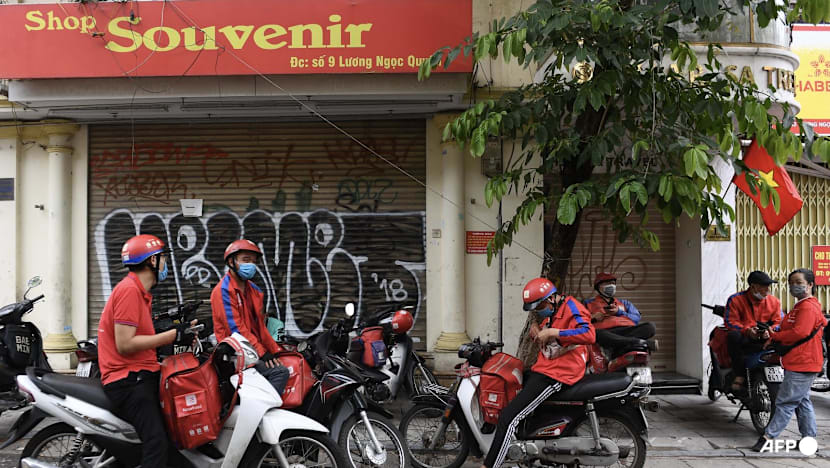
“The rise of gig workers is not a passing trend. It is a transformation of Malaysia’s labour landscape,” said Masrizal Mahidin, president of the Malaysia E-Hailing and Delivery Organisation (MEDO).
The Malaysian government estimates there are now 1.2 million active platform-based workers in the country, compared to 466,000 before the pandemic.
“These are not abstract numbers,” Masrizal said. “They represent young graduates, single parents, and everyday Malaysians who have turned to gig work for survival and opportunity. Their growth has transformed gig work from a side hustle into a pillar of the national labour market.”
A similar story unfolded in Thailand.
“I estimate that back then (2019 to 2020), it was somewhere around 300,000 to 400,000 (app-based gig workers). That was the peak,” Akkanut Wantanasombut, head of the Research Group in Innovation for Social Solidarity and Inclusive Economy at Chulalongkorn University told CNA.
“It was the only industry that could grow during COVID-19. The service sector was dying, so people left those jobs and worked with the platforms instead.”
Getting a true picture of today’s numbers in Thailand is difficult, as figures often overlap between platforms. But Akkanut noted that participation has declined since the pandemic.
“Nowadays, the numbers have reduced a lot because working conditions have become worse and worse,” he said. “Pay has become lower and lower. And those who are still working for the platform are those who really have no other choice.”
In Indonesia, Southeast Asia’s largest economy, workers have even fewer alternatives.
A shrinking middle class has pushed domestic consumption down, forcing factories to close. As a result, the number of ride-hailing and delivery riders has soared from 4 million in 2020 to 7 million in 2025, according to government data.
“If I had to choose, I would rather work in a company,” said Dede Supriatna, 57, who lost his job at a tour and travel agency last year. “We have no social security, no insurance. If we get into an accident or find ourselves trapped in the middle of a riot like Affan, we are on our own.”
“The platform doesn’t care if an order comes from a dodgy neighbourhood, or if the road is flooded, or if there is a riot like the ones we keep seeing in the last few weeks,” he added.
“If we don’t take the order, we don’t get paid. And we get bad reviews and are punished by the platform.”
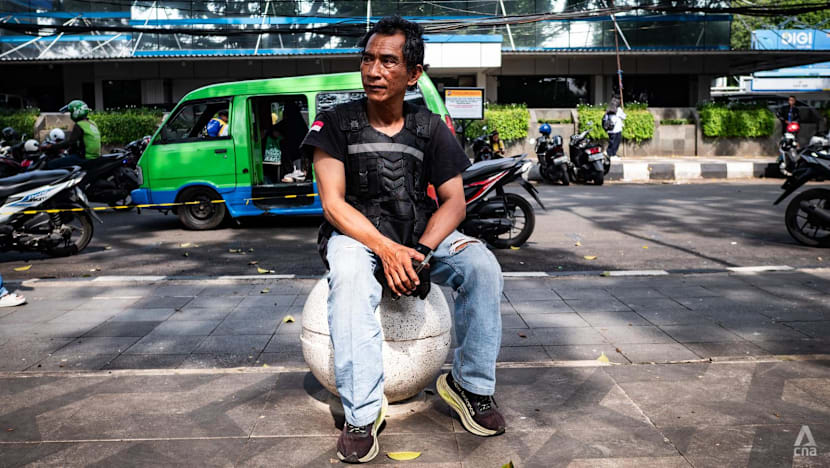
In recent years, rising living costs, sluggish economic growth, the scaling back of benefits and limited employment opportunities in parts of the region have pushed gig workers to be more vocal about their grievances and demands.
According to Adrian Pereira of the North South Initiative (NSI), a group that advocates for labour rights, Southeast Asia’s labour movements have traditionally been non-confrontational and diplomatic. But the recent wave of protests in Indonesia shows that patience has limits.
“There will always be a tipping point where workers will say enough is enough,” he said.
In some Southeast Asian cities, platform workers have staged protests outside company offices or government buildings. Others have sought audiences with lawmakers and ministers, urging them to fight for their rights.
In Indonesia, gig workers have even begun running for local council or regional representative seats and a number of them have won, paving the way to carry their grievances directly into the political arena.
Among them was Erwin Siahaan who became a city council member in Medan, North Sumatra from 2019 to 2024, and Mukti Junianto, who is now an active city council member in Solo, Central Java.
Another former ride-hailing driver was former deputy minister for manpower-turned-corruption suspect Immanuel Ebenezer. Immanuel was a gig worker from 2016 to 2019. His political career took off after founding Jokowi Mania, a group supporting former president Joko Widodo's re-election bid in 2019.

LAWS PASSED IN SOME COUNTRIES; OTHERS CATCHING UP
Governments and companies across the region are beginning to respond, albeit unevenly.
In September last year, Singapore became the first Southeast Asian nation to pass a law protecting gig workers’ rights. Under the Platform Workers Act, delivery riders and ride-hailing drivers will see higher Central Provident Fund (CPF) contributions to support housing and retirement adequacy, coverage under work injury compensation, and the right to representation in union-like associations.
Malaysia followed suit on Aug 28 with its Gig Workers Act. The law requires all platforms and companies engaging gig workers to provide contracts that spell out minimum standards for payment terms, working arrangements, insurance coverage, and termination procedures. It also created a Gig Workers Tribunal to resolve disputes.

Elsewhere, governments are still catching up.
In Indonesia, attempts to amend its labour laws to include gig workers have dragged on for years while attempts to formulate a new bill on app-based transportation have yet to materialise.
The only formal safeguard so far is a 2022 transport ministry regulation that caps platform commissions at 20 per cent. Critics say it remains toothless, allowing companies to set prices arbitrarily while the government fails to monitor compliance.
Transportation expert Akbar argued that Jakarta is reluctant to act more aggressively because ride-hailing platforms are plugging holes left by the state in terms of job creation and providing reliable public transportation. “They fill a gap that should have been the state’s responsibility,” Akbar said.
Since last year, gig workers in Indonesia have been calling for the platform commissions cap to be lowered to 10 per cent and for platforms to standardise prices instead of changing them arbitrarily.
These demands have largely fallen on deaf ears, with both the government and companies insisting the 2022 regulation is already fair.
However, there was one demand made during a Feb 17 protest that was met by the Prabowo administration: For platforms to provide Idul Fitri bonuses to gig workers which amount to 20 per cent of their average monthly income.
Drivers reported receiving anywhere from 50,000 to 1 million rupiah (US$3 to US$59.70) ahead of this year’s Idul Fitri holiday in March. The government promised that the bonuses would not be one-off but has yet to formalise the requirement in the form of a government regulation.
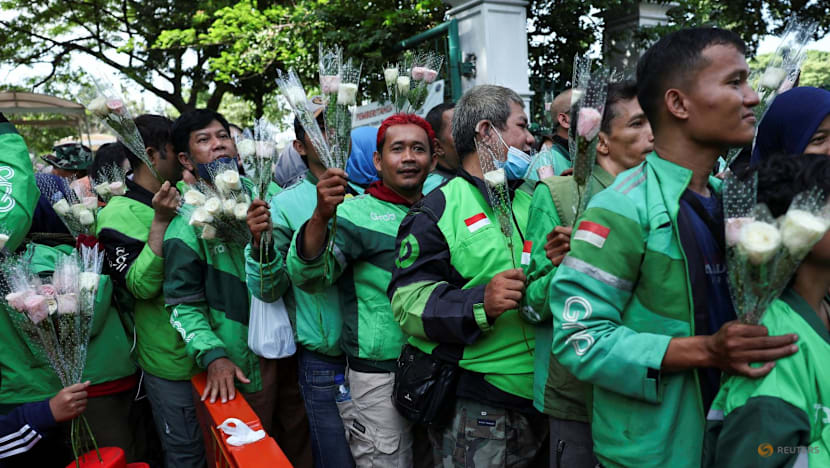
Meanwhile, Thailand is drafting a bill aimed at providing gig workers social security, insurance, protection against arbitrary termination and the ability to conduct collective bargaining.
But the process has been beset by disagreements and a lack of clarity over the definition of this new type of worker.
Isriya Paireepairit, vice-president for public affairs at tech company Line Man Wongnai, which has more than 140,000 drivers, welcomed the idea of an independent worker social security fund but raised concerns over implementation.
“For instance, how would benefits work for occasional riders who contribute less compared to regular riders who contribute more? Would insurance cover only jobs accepted through the platform? And how would the government verify riders’ working hours, earnings and activity data to ensure fair eligibility and accurate benefit distribution?” Isriya told CNA.
“Gig workers often work across multiple platforms ... It’s still unclear how responsibilities for gig worker’s benefits are shared among different platforms.”
Worker groups representing riders have also opposed elements of the proposed bill at various stages, while academics remain sceptical.
“I don't have any hope,” said Akkanut of Chulalongkorn University. “The regulators are very weak. They don't really understand the new type of employment. And our labour laws are very old.”
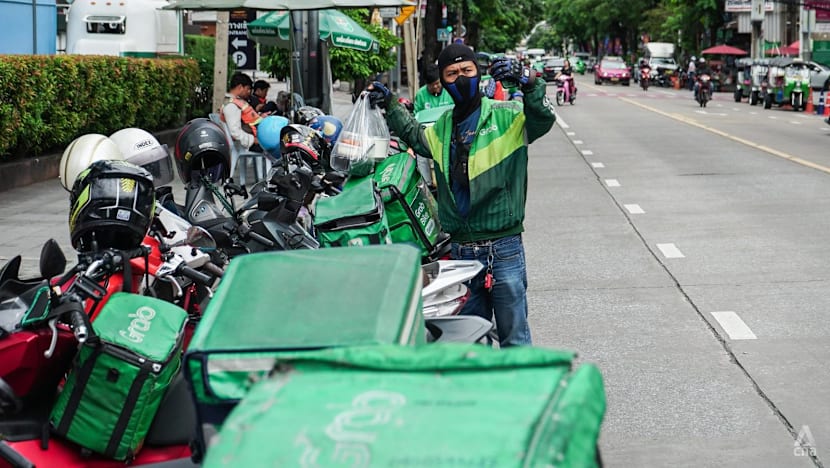
LIMITED BARGAINING POWER?
Despite their numbers and the ability to disrupt daily mobility and routines, riders often struggle to convert street power to lasting political leverage, observers said.
Indonesia’s gig economy drivers have, for instance, protested repeatedly over the last few years for better wages and policies such as a lower cap on platform commissions.
“Unlike student groups, whose activism is often tied to broader ideological or political agendas, riders’ protests are rooted in immediate livelihood concerns, which makes their demands very pragmatic,” said Siwage of ISEAS-Yusof Ishak Institute.
Their communication networks also differ. Riders rely heavily on digital platforms, messaging apps and social media channels that are already integral to their daily work. This network allows them to coordinate quickly.
“This gives their protests a spontaneous and decentralised character, which is very different from the more structured networks of student organisations. Nonetheless, their fragmented nature and lack of formal representation often limit long-term bargaining power,” Siwage said.
Mathew Mathews, principal research fellow at the Institute of Policy Studies (IPS) at the National University of Singapore, said gig workers in the city state used to be just as fragmented and disorganised.
“While highly visible, their voices are not the strongest,” he told CNA. “For one, they are not seen as a unified group of workers. Many see them as part-timers, who may not be doing platform work as a dedicated career.”
Their voices began to be heard after research institutes and established organisations like the National Trades Union Congress (NTUC) became involved, as the Advisory Committee on Platform Workers was formed in 2021 following then-Prime Minister Lee Hsien Loong’s speech at the National Day Rally which called for better protections for platform workers.
This, Mathews said, “worked to surface some of the concerns of this group and their needs which finally resulted in the government moving to ensure that such workers had proper work injury protection and CPF adequacy”.
Since the enactment of the Platform Workers Act, the National Delivery Champions Association (NDCA), which represents delivery platform workers in Singapore, told CNA that they have gained formal recognition from major platform operators like Grab, Lalamove and GogoX.
Andy Ang, NDCA’s executive secretary, said this recognition provides the association with the “legal backing” to negotiate improved conditions for platform workers.
In January this year, under the Platform Workers Act, NDCA and two other NTUC-affiliated associations – the National Taxi Association and the National Private Hire Vehicles Association – were officially registered by Singapore’s Ministry of Manpower as Platform Work Associations.
“We’ve had to adapt how we engage with delivery riders as compared to salaried workers,” said Ang, whose association is affiliated with NTUC.
“Instead of meeting at fixed workplaces, we reach them through social media channels and at delivery hubs and hold regular outreach sessions at locations where riders naturally gather,” he added.
Meanwhile in Malaysia, the Gig Workers Act came after years of protests and lobbying.
“This development is not an act of benevolence. It is the product of sustained organising, vocal advocacy, and the undeniable reality that gig workers have become central to Malaysia’s transport, delivery, and digital economy,” said Masrizal of MEDO.
MEDO was among the 63 non-governmental organisations that took part in a peaceful Labour Day rally in Kuala Lumpur on May 1 this year, calling for improved workers’ rights, reported news outlet Astro Awani.
“When ministers directly address riders and drivers, when Parliament enacts laws in our name, it signals that gig workers have emerged as a political force to reckon with,” he said.
Malaysia’s Human Resources Minister Steven Sim, who championed the proposed law in parliament, described its passage as a “bold step forward” in securing social security and fairness for all gig workers in the country.
The government is “sending a strong signal that every worker matters, whether in formal sectors or informal sectors, on digital platforms or outside them”, Sim told CNA.
“The reason (for the Act) is simple - if the law does not define, it cannot defend.”
MORE REFORMS NEEDED
While gig workers have already reshaped Southeast Asia’s labour landscape and become part of political calculations, questions remain on how governments, companies and workers can forge a sustainable path forward.
Siwage said the sector is likely to evolve through a mix of formal and informal negotiations.
“Over time, the industry may move toward a new equilibrium characterised by consolidation around a few dominant platforms and a more stable pool of workers,” he noted.
“The trajectory will be shaped not only by labour activism but also by broader macroeconomic dynamics. Slowing growth, rising living costs, and pressures on job creation could push more people into gig work, even as governments face increasing pressure to extend social protection and regulate platform labour.”
Policy responses will be decisive in achieving flexibility and shaping how various challenges are managed.
Countries like Singapore have shown that it is possible to balance innovation with protection, introducing schemes such as portable benefits, mandatory insurance and CPF top-ups, Siwage highlighted.
“Poor work conditions and perceptions of unfairness need to be addressed quickly before they result in substantial disruption to society,” Mathews from IPS said.
He noted that in the region, the standard methods for workers to address their concerns through unions have been limited since “they are not accorded the employee status”.
In Malaysia, the newly enacted Gig Workers Act is giving delivery riders and e-hailing drivers greater ease of mind.

“We now have a bigger voice, and this has come from political willingness to protect us,” said 30-year-old P Vishnovartan, who graduated in technology management but chose to do gig work because of its flexibility.
While he is satisfied with the new law for now, he hopes for improvements such as contributions by the platforms to the Employers Provident Fund, which is Malaysia’s retirement fund.
"We are afraid that those in the gig economy will not have enough funds for retirement later, and this can impact the government in the long run,” he said.
Elsewhere, progress is patchier and the risks greater, particularly as Southeast Asia braces for slower growth and uncertainty driven by global trade tensions.
Akbar, the Jakarta-based analyst, warned that without decisive reforms, countries may face more unrest like the protests triggered by Affan’s death.
“His death is not just an individual tragedy. It illustrates the vulnerability of gig workers in our social landscape (and of) informal workers struggling daily in cities (who are) often overlooked by the state,” he said.
“The state cannot continue to take a passive stance toward this vast movement involving millions of drivers. Formal recognition of online motorcycle taxis as part of the national transport system, along with labour protection, social security and the right to organise and voice their aspirations, must be part of future reforms,” Akbar added.
“Without such measures, we are only waiting for the next wave of social eruptions, which may emerge with greater force and wider reach.”



























